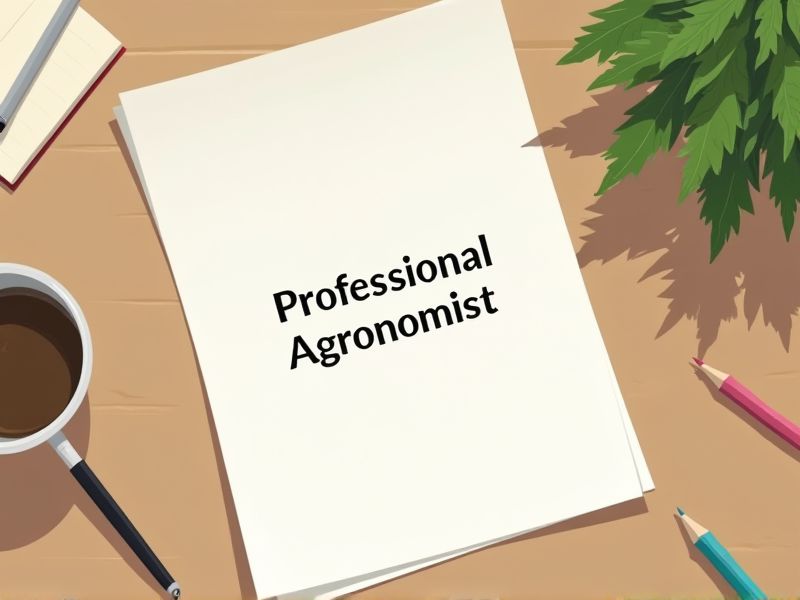
In the agricultural industry, precise knowledge and skills are crucial for addressing complex farming challenges. Certifications provide a structured pathway for agronomists to enhance their expertise and credibility. They ensure that professionals stay abreast of the latest technologies and sustainable practices. Key certifications for professional agronomists include those that align with industry standards.
Certified Professional Agronomist (CPAg)
Certified Professional Agronomists (CPAg) are essential for ensuring best practices in crop management, as their certification verifies their extensive knowledge and adherence to industry standards. Having a CPAg designation enhances credibility and trust with clients, influencing a higher adoption of scientifically-based agronomic decisions. The rigorous certification process encourages continuous education, which leads to updated, data-driven practices that increase agricultural efficiency. CPAgs play a pivotal role in addressing complex environmental issues by applying sustainable practices that optimize yields while minimizing ecological impact.
Certified Crop Adviser (CCA)
Certified Crop Advisers (CCAs) play a critical role in providing agronomists with updated expertise on best practices for crop production, ensuring high yields and sustainability. The CCA program emphasizes continuing education, which helps agronomists stay informed about the latest research and technological advancements. Agronomists gain credibility and trust among farmers and stakeholders when backed by CCA credentials, as it symbolizes a standardized level of professionalism and knowledge. The certification process further instills a deep understanding of environmental stewardship, emphasizing the balance between agricultural productivity and ecological health.
Certified Organic Specialist
Certified Organic Specialists bring expertise in organic farming principles, ensuring agronomists implement practices that comply with certified standards. Their understanding of pest management and soil health can improve crop yield and quality without relying on synthetic inputs. Access to organic markets often requires certification, which specialists navigate successfully, enhancing profitability. Their knowledge mitigates risks associated with transitioning to organic systems, fostering long-term sustainability.
Certified Professional Soil Scientist (CPSS)
Having a Certified Professional Soil Scientist (CPSS) on board provides expertise in soil management, which enhances crop productivity for agronomists. The CPSS knowledge in soil health and sustainability ensures environmentally sound practices, reducing negative impacts on ecosystems. Precision in soil assessment from a CPSS can lead to optimized input usage, promoting cost-effective agricultural practices. A CPSS partnership enables access to up-to-date soil science advancements, aligning agronomic strategies with current research and technologies.
Integrated Pest Management (IPM) Certification
Integrated Pest Management (IPM) certification equips professional agronomists with the skills to use environmentally friendly pest control methods, reducing reliance on chemical pesticides. This certification ensures agronomists are up-to-date with current sustainable practices, enhancing crop health and yield. IPM certification increases an agronomist's credibility among clients seeking sustainable agriculture solutions. The certification aligns agronomy professionals with regulatory standards and market trends, improving compliance and competitiveness in the agricultural sector.
Precision Agriculture Certification
Precision agriculture certification equips professional agronomists with specialized skills to implement advanced technologies effectively, boosting crop yields. By being certified, agronomists validate their expertise, thus enhancing credibility and trust among clients and stakeholders. This certification ensures agronomists stay updated with the latest industry trends, fostering sustainable and efficient farming practices. The growing demand for precision agriculture techniques necessitates certified professionals to meet industry standards and regulatory requirements.
Sustainable Agriculture Certification
Sustainable Agriculture Certification equips professional agronomists with critical knowledge about environmentally-friendly farming practices. Certified agronomists can improve crop yields while minimizing ecological impacts, a crucial need in addressing global food security. Certification enhances professional credibility and trust among consumers, elevating market competitiveness. As climate change intensifies, certified experts play a pivotal role in implementing adaptive and resilient agricultural strategies.
Environmental Compliance Certification
Environmental compliance certification is essential for professional agronomists to ensure adherence to regulations that prevent ecosystem degradation. Certification helps agronomists apply sustainable practices that reduce chemical runoff and soil erosion. It enhances credibility in consulting roles, attracting clients who prioritize environmental stewardship. Compliance reduces the risk of legal penalties associated with non-adherence to environmental laws.
Agricultural Safety Certification
Professional agronomists work in environments filled with potential hazards like heavy machinery, chemicals, and unpredictable weather, making agricultural safety certification essential to mitigate risks. This certification ensures they possess the knowledge to implement safety protocols, reducing the likelihood of accidents. With proper certification, agronomists are better equipped to educate and lead farmworkers in maintaining a safe workplace. Employers and clients prioritize certified professionals, recognizing their commitment to safety and regulatory compliance.
Farm Business Management Certification
Farm Business Management Certification equips professional agronomists with crucial financial planning skills, essential for sustainable farm management. By understanding economic principles, agronomists can advise on cost-effective crop production, improving profitability. This certification also enhances decision-making abilities related to resource allocation and risk management. Agronomists with certification gain a competitive edge, appealing more to employers who value comprehensive expertise.
Summary
As a reader considering certification, you'll likely gain advanced expertise and credibility, enhancing job prospects in the agronomy field. Certifications often lead to higher earning potential due to recognized proficiency and specialization. Employers typically gain increased confidence in certified professionals, potentially leading to expanded roles and responsibilities. The agronomic community may experience enhanced innovation and productivity when certified experts contribute their refined knowledge and skills.
